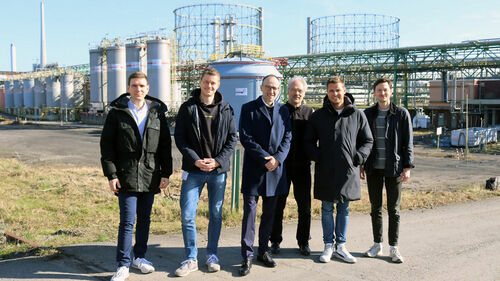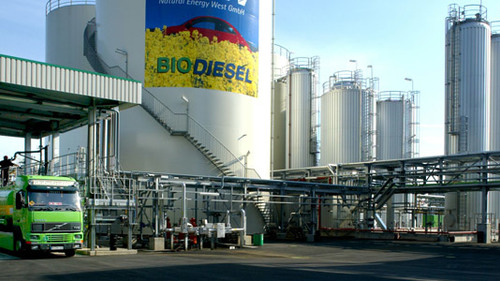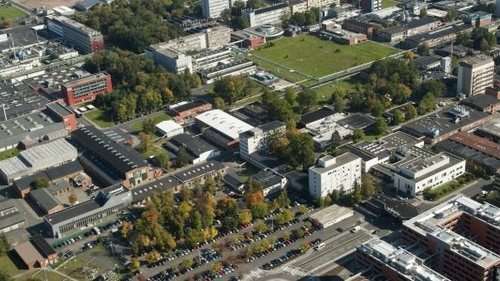Greenlyte strengthens Marl Chemical Park in expanding its hydrogen hub
Marl. Greenlyte Carbon Technologies plans to build a plant at the Marl Chemical Park for the CO2 - neutral production of eMethanol from the air. The Essen-based startup has now received multi-million euro funding as part of the "Produktives.NRW" program, which is co-financed by North Rhine-Westphalia and the European Union. The total investment for the plant is approximately 25 million euros. The Marl Chemical Park is providing approximately 3,000 square meters of space and the necessary infrastructure. The plant is scheduled to go into operation at the end of 2026.
"Greenlyte's production facility is a welcome further step for the Marl Chemical Park on its journey to further expand its hydrogen hub," says Thomas Basten, head of the Evonik site. Florian Hildebrand, CEO of Greenlyte, adds: "We are pleased to have found not only a location for the construction of our production facility in the Marl Chemical Park, but also an innovative and environment in which the transformation of the chemical industry is becoming a reality." The location marks the starting point for both sides to explore further cooperation opportunities.
Greenlyte uses its proprietary direct air capture technology in production. This technology will capture up to 1,400 tons of carbon dioxide (CO₂) from the ambient air annually. An integrated process will also produce approximately 200 tons of green hydrogen (H₂). In a subsequent step, the molecules produced in the process—green hydrogen and green carbon dioxide—will be synthesized into up to 1,000 tons of green eMethanol per year. Methanol is an essential basic raw material for many chemical plants at the site.
The establishment of Greenlyte is part of several sustainable hydrogen activities at the Marl Chemical Park. As part of the GET H2 initiative, Evonik and numerous other companies are working to build the first publicly accessible hydrogen infrastructure in Germany. This includes the conversion of a natural gas pipeline from Marl to Legden and the construction of a new connecting section to Scholven.
The site is also home to various innovative technologies: For example, Evonik's Rheticus research project uses hydrogen in artificial photosynthesis to produce specialty chemicals from CO2 with the help of bacteria in a pilot plant . Furthermore, Evonik is investing a low double-digit million euro amount in the construction of a pilot plant for the production of its proprietary anion exchange membrane, DURAION®. It is a key component in AEM water electrolysis and has the potential to enable the cost-effective production of green hydrogen.
Hydrogen has a long history at the Marl Chemical Park: It has played an important role in production for 85 years. Approximately 25,000 cubic meters are processed here per hour. The site's extensive expertise in handling hydrogen distinguishes it and will now be used for a lower-carbon future .
Categories
Investments
2025-01-01
€ 25 mln at Marl Chemical Park (DE)Countries
Companies
Latest news
INEOS launches €250m investment supported by the French Government to secure the future of French industry at Lavera
The project marks the first phase of a long-term regeneration plan to reduce emissions, boost reliability, efficiency and competitiveness, with support of the French State.
Hycamite’s technology to decarbonize shipping awarded AiP by industry leader DNV
Kokkola Industrial Park →Hycamite’s proprietary Thermo-Catalytic Decomposition (TCD) technology offers a new approach to producing clean hydrogen by breaking down methane, the primary component of liquefied natural gas (LN...
Clariant catalysts will power the Ecoplanta: Europe's first waste-to-methanol plant
Chemmed Cluster Tarragona →Repsol is building Europe’s first plant to produce renewable methanol from urban waste The facility will use Enerkem gasification technology to produce 240 KTA of methanol Clariant will supply cata...
Lilly plans to build a new $3 billion facility to boost oral medicine manufacturing capacity in Europe for patients worldwide
Netherlands site will bring 500 manufacturing and 1,500 construction jobs while further strengthening Lilly's global supply chain



